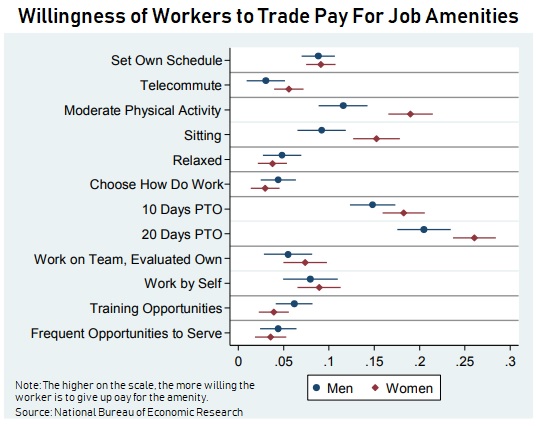Last month, Bloomberg reported that employees will give up big pay raises in exchange for job perks. The reported statistics from a study published by the National Bureau of Economic Research were eye-catching, the Bloomberg headline teasing that “Americans Are Willing to Forgo a 56% Pay Raise for Best Job Perks.”
 At the end of the day, I agree with the findings, but not the headline. Employees do not give up pay for perks! They will, however, give up compensation for the right cultural fit – things that matter to them, such as increased meaning or greater autonomy. Employees who forego pay do so because they align with the key values and opportunities that are woven into a company’s culture. These values cannot be doled out like bonus bucks. Great cultures require hard work and constant care. Flashy perks are easy.
At the end of the day, I agree with the findings, but not the headline. Employees do not give up pay for perks! They will, however, give up compensation for the right cultural fit – things that matter to them, such as increased meaning or greater autonomy. Employees who forego pay do so because they align with the key values and opportunities that are woven into a company’s culture. These values cannot be doled out like bonus bucks. Great cultures require hard work and constant care. Flashy perks are easy.
What’s a ‘perk’?
As suggested, my consternation with the article has more to do with how the term “perks” is defined. Let’s unpack what I mean. A reasonable definition is that a perk is an employee benefit that does not have an immediate cash component tied to it. Thus, wages, health insurance, retirement benefits, all of which are measured in dollars, are not perks. The list of perks in the study, while non-wage in nature, do not fall into the category of what we traditionally think of when we use the term perks. In most HR circles, perks are things like state-of-the-art breakrooms, onsite gym facilities, employer-provided daycare, etc. Yes, these benefits have a monetary value, but their value is indirect to the employee.
What I find most interesting in the list is that almost every one of the “perks” is exactly as I described above. They are values centered around the organization’s culture. In my view, culture is the way things function in a workplace environment coupled with the organization’s supported values. Not their publicly stated values, but the organization’s actual values, and yes, there is a difference.
Employee engagement drivers
For us at DecisionWise, these findings are not surprising. They support what we have found in our research – employees are motivated far more by meaning, autonomy, growth, impact, and connection than by other factors. We call these employee engagement drivers the five keys of employee engagement, and they form the acronym M.A.G.I.C.
Thus, we weren’t surprised when, as Bloomberg said, the study found that time off is huge. We know that the right amount of employee autonomy is vital in building a culture of employee engagement. The same can be said for the notion of company-supported training. This is really an issue of whether an organization values and provides growth opportunities for its employees. Do they see a pathway forward to a better place professionally, both in terms of skillsets and opportunities? Again, these are cultural characteristics and not perks.
A culture built around values
At the end of the day, I essentially agree with the results of the study as reported in the article. It accurately notes that organizational cultures built around values that matter to employees are more successful at fostering employee engagement than those focused on the employment transactions, such as traditional perks, pay, and incentives.
A version of this article was originally published on the DecisionWise blog.
